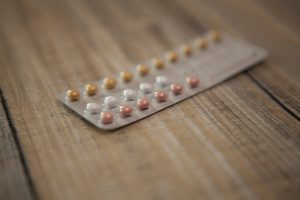Let’s talk about sex.
There are several times over the course of a woman’s life when changes in sexual interest and enjoyment can be compromised. The causes for these changes are often multifactorial. Hormone changes with the menstrual cycle, during and after pregnancy, and perimenopausally can contribute to low libido, vaginal pain and dryness, pelvic pain, and decreased sexual response. Unlike men, who for years have had medications to address similar issues, women have often received less attention and fewer therapeutic options.
A thorough history & evaluation that assesses any medical, psychological, or relationship factor that may be contributing to sexual health issues is the first step. ISSWSH is a great place to find a provider who specializes in these issues. Systemic conditions like thyroid dysfunction, low testosterone, and nutrient deficiencies and local concerns like infections or muscle spasms can contribute to sexual issues. There are some medications, like birth control pills and antidepressants, that can interfere with sexual function and, of course, these should be identified and alternatives discussed if possible. If structural issues appear to be a factor, a referral to a pelvic floor physical therapist may be in order. If relationship issues are compounding a physical problem, individual or couples counseling may be an important part of the treatment plan. You can find referrals for these providers on my resources page.
 A consensus statement from an international panel of experts has finally weighed in on the topic of testosterone therapy for sexual function in perimenopausal women. There are many contributing factors to sexual function at any age and a careful history and physical should be conducted to rule out any other causes of hypoactive sexual desire. However, this paper acknowledges the role of decreasing testosterone levels in women as a moderate contributing factor worthy of evaluating and addressing. This is something that many clinicians have known for a long time and have treated patients accordingly, but it is nice to have the support and acknowledgment of the major endocrine societies that have contributed to the statement. In addition, it is important to note that low testosterone can be an issue for women on birth control pills, in postpartum, and up to 15 years before the last menstrual period in menopause, which typically occurs around age 50. Most experts in the field agree that even low normal levels of testosterone can negatively impact libido and sexual function.
A consensus statement from an international panel of experts has finally weighed in on the topic of testosterone therapy for sexual function in perimenopausal women. There are many contributing factors to sexual function at any age and a careful history and physical should be conducted to rule out any other causes of hypoactive sexual desire. However, this paper acknowledges the role of decreasing testosterone levels in women as a moderate contributing factor worthy of evaluating and addressing. This is something that many clinicians have known for a long time and have treated patients accordingly, but it is nice to have the support and acknowledgment of the major endocrine societies that have contributed to the statement. In addition, it is important to note that low testosterone can be an issue for women on birth control pills, in postpartum, and up to 15 years before the last menstrual period in menopause, which typically occurs around age 50. Most experts in the field agree that even low normal levels of testosterone can negatively impact libido and sexual function.
Though a specific FDA-approved testosterone replacement for women does not exist, the recommendations support the use of an FDA-approved product for males at decreased doses or an equivalent compounded product via a reputable pharmacy. The statement does not support the use of pellets or injections as these delivery methods often cause supraphysiological testosterone levels which may be dangerous or cause side effects over time. The paper states that testosterone replacement may be a safe and effective treatment for women who demonstrate low levels of total testosterone on blood tests, as long as replacement doses do not produce supraphysiological levels. Testosterone can be administered for this purpose via a gel, cream, troche, or lozenge. The panel also calls for more research to be done in this understudied, undertreated area of women’s health.
 Testosterone isn’t the only therapy for the treatment of sexual issues in women. Over-the-counter topicals like Replens or RepHresh can help moisturize dry vaginal tissue. Maca has been found in several studies to improve libido. Acupuncture has been shown to decrease the low libido common in anti-depressant therapy and to reduce the discomfort and improve satisfaction in women with vulvar and pelvic pain. Estrogen therapy, both vaginally and/or systemically, can be useful in both issues of low libido and pain with intercourse. DHEA has been approved by the FDA and shown in several studies to improve the health of vaginal tissue. Flibanserin (Addyi) is an FDA-approved medication for hypoactive sexual desire, but needs to be taken daily and can cause side effects like dizziness, low blood pressure, and fainting. Bremelanotide (Vyleesi) is an FDA-approved injection to be used prior to sexual activity, but it too can cause cardiac side effects.
Testosterone isn’t the only therapy for the treatment of sexual issues in women. Over-the-counter topicals like Replens or RepHresh can help moisturize dry vaginal tissue. Maca has been found in several studies to improve libido. Acupuncture has been shown to decrease the low libido common in anti-depressant therapy and to reduce the discomfort and improve satisfaction in women with vulvar and pelvic pain. Estrogen therapy, both vaginally and/or systemically, can be useful in both issues of low libido and pain with intercourse. DHEA has been approved by the FDA and shown in several studies to improve the health of vaginal tissue. Flibanserin (Addyi) is an FDA-approved medication for hypoactive sexual desire, but needs to be taken daily and can cause side effects like dizziness, low blood pressure, and fainting. Bremelanotide (Vyleesi) is an FDA-approved injection to be used prior to sexual activity, but it too can cause cardiac side effects.
The position statement and new medications not only pave the way for more women to access effective therapy for their low sexual function, but my hope is that it will also open the lines of communication between women and their providers on this often sensitive and largely ignored issue. So let’s talk about sex. Do you have more questions? Contact me for more information and I’ll get you the answers you need.












